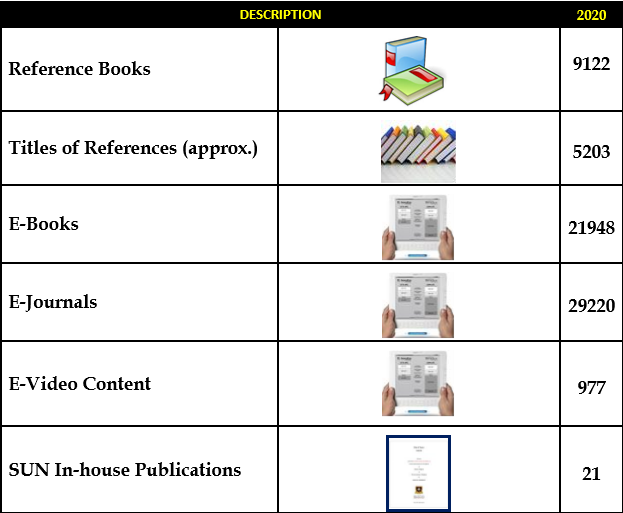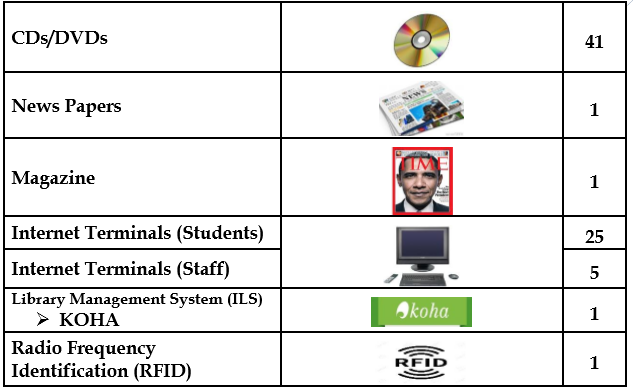Introduction
Over the past few years, several techniques and related standards have been developed which allow documents to be created and distributed in electronic form. Hence to cope with the present situation, librarians have shifted towards new media, namely electronic resources for their collection developments, combined with physical books. An electronic resource requires computer access or any electronic product that delivers a collection of data, be it text referring to full-text bases, electronic journals, image collections, other multimedia products and numerical, graphical or time-based, as a commercially available title that has been published with an aim to being marketed. These may be delivered on CD ROM, on tape, via internet and so on.
To provide a well-equipped library comprising of physical and e-resources which are rich in content for easy access within Skyline University Nigeria Library and outside, the University Library is providing access to quality resources and innovative services to stimulate creativity, intellectual curiosity and to facilitate lifelong learning and research within its community. The library is at the forefront of providing information services to its stakeholders which comprises of students, faculty, supporting staff and other members by which SUN has an agreement with, in order to support their teaching, learning and research needs.
How E-Resources Facilitate Students Learning in Skyline University Nigeria
Due to the COVID-19 lockdown that allows Skyline University Nigeria to adopt virtual learning methodologies, the e-resource section of the university received overwhelming attention due to inherent capabilities for manipulation and searching, providing information access is cheaper to acquiring information resources, savings in storage and maintenance etc. and sometimes the electronic form is the only alternative. In the same vein, due to the several advantages of EIRs such as their timeliness, search facilities, remote access and up-datedness, they have become more indispensable after the arrival of the Internet in the academic environment.
The provision of EIRs in tertiary institutions of learning is a new way of gaining quick access to a great number of research information globally (Ekong and Ekong 2018). As a result of the potential benefits offered, they have been embraced by University libraries. Skyline University Library users generally benefits from the EIRs which provide an excellent opportunities to access scholarly information which are beyond the reach of libraries due to geographical barriers and limited finances.
The SUN University library has three databases to which it subscribed annually (EBSCOHost ProQuest and IGI Global). E-resources are basically divided into two major types, that is Online e-resource (E-journal, full text & bibliography, E-books, Online databases, Web sites) and other electronic resources (CD ROM, Diskettes and Other portable computer).
Skyline University Nigeria Fact Book as at Thursday 11th February, 2021


The e-resources have facilitated students’ Teaching Learning and Research activities in the following ways;
Online Assessment
Assessing student learning is an essential component of effective teaching and learning in the online environment.
Writing Assignments:
Short essays, research papers, case study responses are some of the examples of what you can get from e-resources. Students can search for review and information on an assignment electronically. Faculty on the other hand can assign students to small groups to provide peer feedback and build community.
Online Discussion:
Asynchronous discussion activities can take place within e-resource platforms. An instructor can initiate class discussions with a set of questions. This can be achieved via the SUN Learning Management System (LMS)
Concept Maps:
Through e-resource, instructors can provide a visual representation of connections between concepts for students learning, labelled links and show relationships between concepts. It is a good tool for formative assessment to evaluate student’s knowledge at certain checkpoints in the course.
Presentations:
Student presentations can be modified to the online learning environment. Students can create presentations (i.e. slide deck or poster) to present to instructor and classmates online and receive instructor and peer feedback.
REFERENCES
-
Aondofa, C. A. (2020). THEABUSITE. Online Source, (Retrieved 2020-01-04.
-
Challenges and Effective Practices” Online Source (retrieved 2021-01-14)
-
Ekong,U. O. & V. E. Ekong (2018). Impact of information literacy skills on the use of e-
-
Faculty Focus, (2009) “Assessing Online Learning: Strategies, Challenges and Opportunities“Online Source (retrieved 2021-01-14)
-
Fujitsu LH, (2014) “Definition and Types of E-resources, Library and Information Network” Online Source, (Retrieved 2021-01-14)
-
library resources among tertiary institution students in Akwa Ibom State. Pakistann Journal of Technology (NIJOTECH), 37(2), 423 – 43
-
Lorna R. Kearns, (2012) “Student Assessment in Online Learning” Online Source (retrieved 2021-01-14)
Mr. Musa Muhammed, is the Assistant University Librarian in Skyline University Nigeria. He has MSc in Information Management from Leeds Beckett University, UK.
You can join the conversation on Facebook @SkylineUniversityNG and on Twitter @SkylineUNigeria
